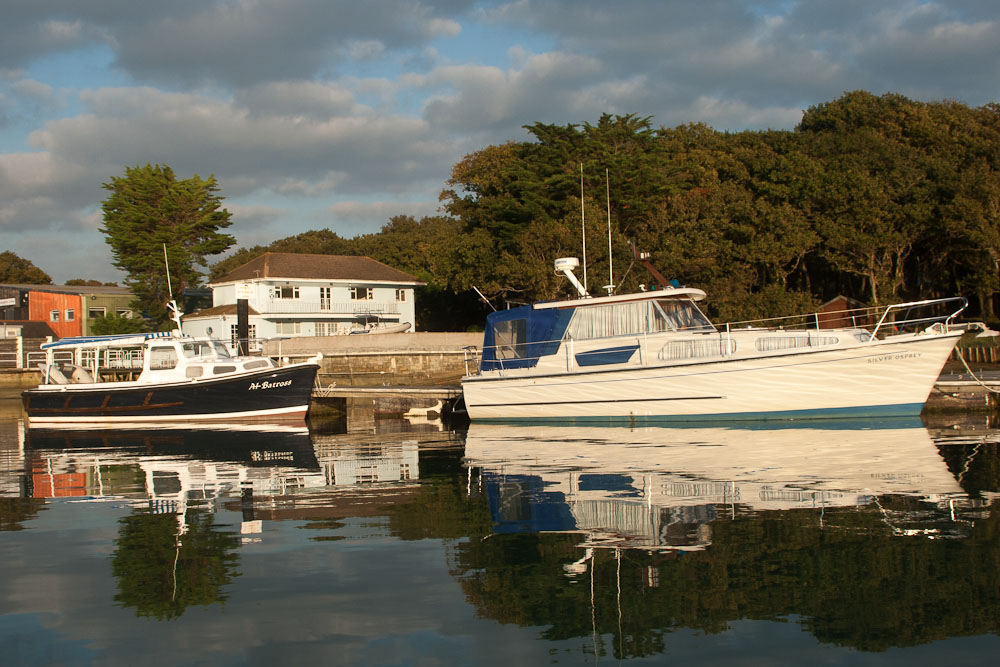While there is no legal requirement to take out boat insurance in the UK, it's essential for responsible boat owners. Insurance protects your vessel from financial loss and damage and covers you from potential third-party claims. All of these can be extremely costly for the uninsured and are risks that are simply not worth taking. After all, your prized yacht didn't come cheap; it's an investment that is worth protecting.
A good insurance policy will save you significantly if you need to make a claim. What's more, many of the UK's marinas demand third-party insurance as a condition for mooring. Still, although boat insurance is highly recommended, there's a load of policies out there to sift through. For an insight into what boat insurance does and what to look for, our essential guide is here to help. Read on to learn how to insure a boat and how much boat insurance costs.
 Insurance protects your vessel from financial loss and damage and covers
Insurance protects your vessel from financial loss and damage and covers
Is boat insurance necessary?
Simply put, yes. As we've said, while you don't legally need it, it provides essential protection from incidents and accidents. What's more, there are certain circumstances in which boat insurance is actually mandatory. These include when financing a new boat with a marine mortgage. Other situations where insurance is required include:
- Racing or chartering your vessel
- Mooring your boat in a harbour or marina
- Using inland waterways where local authorities mandate essential third-party insurance
- Sailing across national borders and in other countries
If you meet any of these criteria, you need to take out insurance. If you don't expect to encounter these scenarios, it's still recommended as long as your boat is in use.
How to choose boat insurance
Whether you own a motorboat, yacht, or fishing vessel, insurance is similar to other auto insurance policies. You can choose from an increasingly wide number of insurers. Luckily, comparing insurance these days is a breeze with countless boat insurance quote comparison websites available. However, instead of getting bogged down on general overall insurance costs, identify the most costly aspect of your boat. You can then check the policy coverage in case of damage to these elements to ensure monetarily sound coverage. What's more, you should always check that your insurer is registered with the Financial Services Authority and British Marine Federation.
When choosing insurance, many look at the level of premium as a deciding factor. All boat insurance policies are different, however, so try and strike the perfect balance between costs and benefits. For starters, you'll have to make sure your policy covers the waters you're sailing on. You'd be surprised how often this step is overlooked, particularly for those now traveling through Europe. International boat insurance will cover you for these international trips. Look at the exclusions, too, like wear and tear coverage. You'll have to look at the wording carefully to choose the coverage that suits your needs. Next, we'll look at the sort of coverage you'll find in your boat insurance policy.
 Comprehensive boat insurance coverage often includes any sort of damage to your boat, its onboard equipment, and trailer
Comprehensive boat insurance coverage often includes any sort of damage to your boat, its onboard equipment, and trailer
Boat insurance coverage
Comprehensive boat insurance coverage often includes any sort of damage to your boat, its onboard equipment, and trailer (if chosen). Hulls, sails, furnishings, and machinery should all be covered within this. As we've highlighted above, always ensure you have coverage for at least the most expensive boat parts. Look for the following boat insurance coverage wording:
Accidental damage
This covers the cost of damage or loss as a result of fire, theft, malicious damage, or collisions. Ensure your policy covers you for time spent ashore in storage, afloat, and in transit. You can also make sure you're covered for lifting and launching. In the event that your boat is damaged beyond repair, you'll often be covered by its current market value.
Loss or damage to personal possessions
Boat insurance covers costs of physical loss and damage to personal possessions aboard your vessel. However, there is usually a set limit for all items at around £1,000. As such, it can be useful to cover extra personal items under existing home insurance or personal bank policies.
Third-party insurance
Third-party liability protects you and your boat from claims from a third party. Typical coverage includes damage done to another boat or property. You'll also be covered in the unlikely event of death or injury to another person. What's more, you'll be covered for financial losses and pollution. Most third-party liability policies cover up to £3 million. It's the most common form of insurance and often the bare minimum required by marinas and local authorities.
Personal accident insurance
Finally, personal accident coverage will cover your boat's passengers against death, loss of limb, or injury. This is more important on fishing and racing vessels where risks are greater. Some insurers include limited personal accident cover free under a comprehensive boat insurance policy. These payout compensation sums in the event of permanent disability or death.
Tip:
All boat policies vary, so ensure you pick the coverage for your individual needs. Most boat insurance costs cover your vessel no matter who the skipper is. Just check the details if your boat is often changing crew.
What exclusions can you expect?
Read through policies carefully as they all include exclusions. These can be make-or-break issues depending on your sailing habits. The following are the most common exclusions you'll find:
- Standard wear and tear: Most policies won't cover the day-to-day effects of sailing like gradual boat breakdown. What's more, corrosion and routine maintenance are not covered. You're unlikely to find many policies out there that cover you from such general and unavoidable damage.
- Wilful misconduct: Boat insurance costs will not cover deliberate or reckless acts of damage. This also goes for sailing under the influence of drugs or alcohol.
- Unattended and unlocked vessels: If your boat is found to have been left unlocked when unattended, you'll forfeit your claim. Always maintain locks to the standards stipulated in your policy to avoid any future issues.
- Commercial or race use: Standard boat insurance policies will not cover you for commercial use unless agreed. Likewise, localised sailboat races may command a premium. The latter will require extended coverage for mast, spars and sails damage.
- Sailing limits: UK-based insurers often cover only UK coastal and inland areas. Additional coverage is required for international travel. Most insurers place a 12 nautical mile limit on offshore sailing, so you're only covered for that distance.
 What are contributing factors to the cost of boar insurance? The type of boat, its condition, size, and age.
What are contributing factors to the cost of boar insurance? The type of boat, its condition, size, and age.
What information affects boat insurance costs?
When you apply for boat insurance, you'll be asked a wide range of questions that impact costs. The type of boat, its condition, size, and age are all contributing factors. The material your boat is made of can also affect quotes. As such, insuring a homemade boat can be much more difficult as insurers cannot assess its structural integrity. For this, you'll have to arrange specialist insurance. Your insurer will also want to know the purpose of your boat. Is it for pleasure? Racing? Chartering? Finally, you'll need to confirm your boat's costs, as well as the cost of any equipment, kept onboard. Tally everything, including life jackets, buoyancy aids, and any other tech you'd like to insure.
Your insurer will also need to know where your boat is kept or moored. This is important as it can both increase or decrease your insurance costs. If your boat is kept in the water for only a season or two, your insurer will need its storage address as well. If you utilize your boat all year round, you may find coverage more costly. In general, boats with fixed moorings and addresses have cheaper boat insurance costs. Finally, you should always inquire if there are discounts for boats kept moored in specific marinas. Check your marina for any associated insurers as these can bring down costs by up to 20%. Similarly, if you change the mooring location after taking out a policy, let your insurer know ASAP. It could otherwise affect any subsequent claims.
How to receive cheaper online boat insurance quotes
There are plenty of ways to reduce boat insurance costs in the long run. For starters, get yourself qualified with certified RYA courses as a helmsman, skipper, or yacht master. These can bring down the costs of your coverage by up to 15%. Be sure to submit any qualifications upon registering to claim these reductions. Keeping your boat or yacht secure and safe will also bring down premiums. Keeping your boat either locked away onshore or within a secure marina berth are ideal. Keep a clean record with no claims, and you can make use of bonuses. Boat insurance works just like any other auto policy, with no claims bonuses available.
While it's up to you, try to pay in annual deposits. Monthly payments often incur additional charges and can work out more costly down the road. Remember, review all potential policies in detail before you make this final purchase. Go through every scenario in which you utilize your boat to analyze the coverage you need. You should be able to narrow down the right coverage so you can set sail in peace.
All clear on how to insure a boat? Then batten down the hatches with a comprehensive policy.
Related Article:


